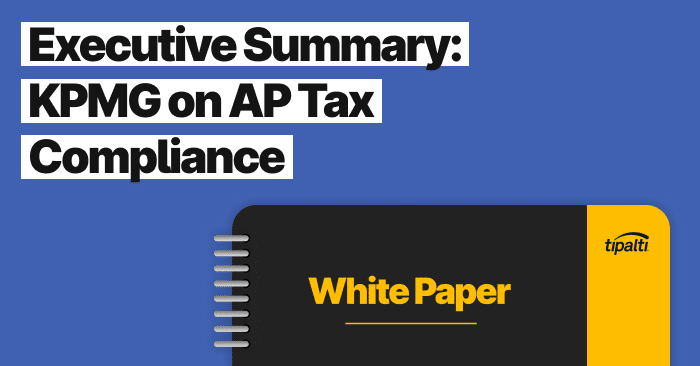
We’ve paired this article with Laurie Hatten-Boyd’s AP Tax Compliance webinar. Get your Executive Summary to find out how FATCA requirements impact organizations with a global supplier base.
Fill out the form to get your free eBook.

Laurie Hatten-Boyd, Principal at KPMG LLP, shared her insights on the impact of US tax compliance rules for companies paying their global suppliers. In this summary of her one-hour webinar, Hatten-Boyd explains how FATCA requirements impact organizations with a global supplier base and the legal and financial penalties they may face for non-compliance. Read the executive summary to get the must-have takeaways from the webinar. – An overview of US tax rules for companies paying global suppliers, including FATCA requirements – Steps your organization can take to avoid legal and financial penalties – How to ensure your payees select the correct form based on their country and corporate structure – How to determine which payees require tax withholding by treaty – The basics around end-of-year 1099/1042-S tax reporting
Accurate tax filings can be complicated and time-consuming without proper tax planning.
Add to that frequent corporate tax law changes and the increasing tax liabilities associated with growing businesses, and it’s easy to be at risk of non-compliance. Conducting year-round tax planning can be a powerful initiative that can benefit your scaling business while consistently remaining tax compliant.
Risk management has long been a top priority for finance leaders, and with the current macroeconomic outlook, minimizing and managing risk—of any kind—is crucial.
The risk of tax noncompliance has grown to be one of the top organizational risks plaguing finance leaders. The impacts of noncompliance can be harmful and far-reaching, such as financial exposure, negative brand reputation, and disruption of operations.
Tax registrations and reporting can often add greater complexities to collecting tax information. The IRS now even requests real-time transactional reporting during audits.
For these reasons, the planning process prioritizes corporate tax compliance while ensuring that your business pays the least amount of taxes legally possible.
Finance Automation Is Changing the Tax Game
Finance automation solves the complex, highly manual process of collecting tax information and can help your business stay compliant year-round. An automated accounts payable solution makes sure data is verified and validated before processing a payment to a supplier or vendor.
Utilizing finance automation ensures you meet IRS requirements, minimizing the risk of penalties or fines. Digital tax form collection and validation also streamline the process by reducing errors and improving efficiency. And incorporating international tax and value-added tax capabilities is beneficial if you issue payments to global suppliers, as it can facilitate adherence to various international laws and regulations.
Finance automation can also provide e-filing and automated tax form generation services, such as 1099 and 1042-S tax preparation reports and necessary withholding calculations. By verifying tax identification number information and running relevant data against the 1,000-plus applicable tax rules, finance automation makes filing taxes more convenient for suppliers while minimizing the risk of errors and delays.
The right technology also serves as a single source of truth, ensuring that your financial data is correct and accessible for finance teams. This makes it possible to discover errors, amend inaccurate reporting, and ensure that the finance team’s processes and workflows are completed quickly and accurately—all while maintaining tax compliance. In this way, technology serves as an automated tax compliance solution.
Know Where You Stand Before the IRS Does
Corporate tax laws are constantly evolving, and staying on top of the constant changes can be daunting—particularly when they are challenging to interpret. For instance, there was a slew of consequential updates to certain state tax codes in 2022, with some changes presenting new opportunities for tax relief and others imposing new tax obligations.
Additionally, the IRS is now taking a more proactive approach to audit preparation, making it imperative that companies mitigate their tax compliance risks well in advance. By being proactive, you can reduce your liability in the future and establish an audit-ready finance function, positioning yourself for long-term success.
By implementing finance automation to ensure year-round tax planning and embracing strategic measures, you can stay ahead of the game and minimize your tax compliance risk, providing peace of mind and greater financial stability.
You can mitigate these risks and be audit ready by catching and documenting any errors before the IRS does. To understand your company’s current tax compliance status, you need a comprehensive review of your documentation, deposits, reporting, and applied withholding rates. To rectify documentation issues, retroactive forms can be filed for missing or invalid documentation, curative documentation can be provided for due diligence failures, and inaccurate reporting can be amended.
Accurate tax filings are essential for businesses, and with frequent corporate tax law changes and increasing tax liabilities, it’s easy to fall into the trap of non-compliance. Year-round tax planning can be an effective strategy to minimize and manage the risk of noncompliance. By prioritizing corporate tax compliance, businesses can avoid financial exposure, negative brand reputations, and operational disruptions. As such, tax planning should be an integral part of every business’s risk management strategy.
